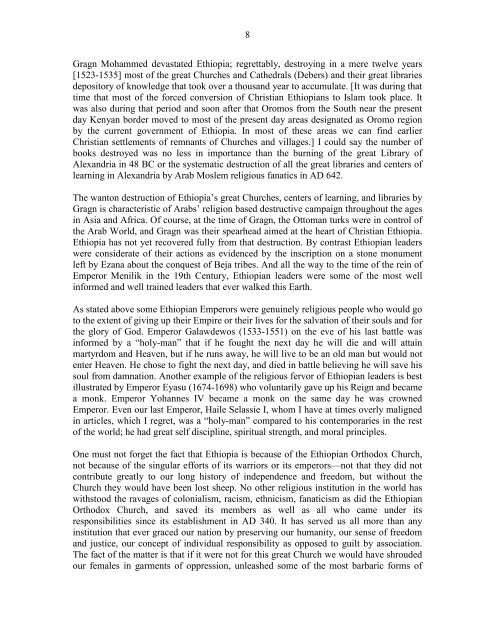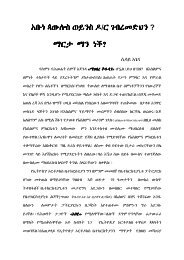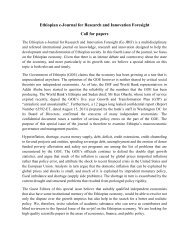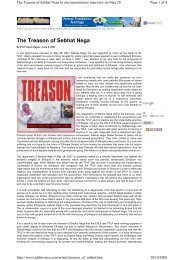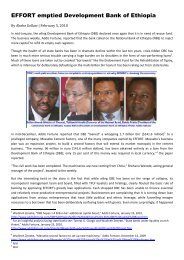Ethiopia and the Future - Ethiopia: A voice for the voiceless
Ethiopia and the Future - Ethiopia: A voice for the voiceless
Ethiopia and the Future - Ethiopia: A voice for the voiceless
Create successful ePaper yourself
Turn your PDF publications into a flip-book with our unique Google optimized e-Paper software.
8<br />
Gragn Mohammed devastated <strong>Ethiopia</strong>; regrettably, destroying in a mere twelve years<br />
[1523-1535] most of <strong>the</strong> great Churches <strong>and</strong> Ca<strong>the</strong>drals (Debers) <strong>and</strong> <strong>the</strong>ir great libraries<br />
depository of knowledge that took over a thous<strong>and</strong> year to accumulate. [It was during that<br />
time that most of <strong>the</strong> <strong>for</strong>ced conversion of Christian <strong>Ethiopia</strong>ns to Islam took place. It<br />
was also during that period <strong>and</strong> soon after that Oromos from <strong>the</strong> South near <strong>the</strong> present<br />
day Kenyan border moved to most of <strong>the</strong> present day areas designated as Oromo region<br />
by <strong>the</strong> current government of <strong>Ethiopia</strong>. In most of <strong>the</strong>se areas we can find earlier<br />
Christian settlements of remnants of Churches <strong>and</strong> villages.] I could say <strong>the</strong> number of<br />
books destroyed was no less in importance than <strong>the</strong> burning of <strong>the</strong> great Library of<br />
Alex<strong>and</strong>ria in 48 BC or <strong>the</strong> systematic destruction of all <strong>the</strong> great libraries <strong>and</strong> centers of<br />
learning in Alex<strong>and</strong>ria by Arab Moslem religious fanatics in AD 642.<br />
The wanton destruction of <strong>Ethiopia</strong>’s great Churches, centers of learning, <strong>and</strong> libraries by<br />
Gragn is characteristic of Arabs’ religion based destructive campaign throughout <strong>the</strong> ages<br />
in Asia <strong>and</strong> Africa. Of course, at <strong>the</strong> time of Gragn, <strong>the</strong> Ottoman turks were in control of<br />
<strong>the</strong> Arab World, <strong>and</strong> Gragn was <strong>the</strong>ir spearhead aimed at <strong>the</strong> heart of Christian <strong>Ethiopia</strong>.<br />
<strong>Ethiopia</strong> has not yet recovered fully from that destruction. By contrast <strong>Ethiopia</strong>n leaders<br />
were considerate of <strong>the</strong>ir actions as evidenced by <strong>the</strong> inscription on a stone monument<br />
left by Ezana about <strong>the</strong> conquest of Beja tribes. And all <strong>the</strong> way to <strong>the</strong> time of <strong>the</strong> rein of<br />
Emperor Menilik in <strong>the</strong> 19th Century, <strong>Ethiopia</strong>n leaders were some of <strong>the</strong> most well<br />
in<strong>for</strong>med <strong>and</strong> well trained leaders that ever walked this Earth.<br />
As stated above some <strong>Ethiopia</strong>n Emperors were genuinely religious people who would go<br />
to <strong>the</strong> extent of giving up <strong>the</strong>ir Empire or <strong>the</strong>ir lives <strong>for</strong> <strong>the</strong> salvation of <strong>the</strong>ir souls <strong>and</strong> <strong>for</strong><br />
<strong>the</strong> glory of God. Emperor Galawdewos (1533-1551) on <strong>the</strong> eve of his last battle was<br />
in<strong>for</strong>med by a “holy-man” that if he fought <strong>the</strong> next day he will die <strong>and</strong> will attain<br />
martyrdom <strong>and</strong> Heaven, but if he runs away, he will live to be an old man but would not<br />
enter Heaven. He chose to fight <strong>the</strong> next day, <strong>and</strong> died in battle believing he will save his<br />
soul from damnation. Ano<strong>the</strong>r example of <strong>the</strong> religious fervor of <strong>Ethiopia</strong>n leaders is best<br />
illustrated by Emperor Eyasu (1674-1698) who voluntarily gave up his Reign <strong>and</strong> became<br />
a monk. Emperor Yohannes IV became a monk on <strong>the</strong> same day he was crowned<br />
Emperor. Even our last Emperor, Haile Selassie I, whom I have at times overly maligned<br />
in articles, which I regret, was a “holy-man” compared to his contemporaries in <strong>the</strong> rest<br />
of <strong>the</strong> world; he had great self discipline, spiritual strength, <strong>and</strong> moral principles.<br />
One must not <strong>for</strong>get <strong>the</strong> fact that <strong>Ethiopia</strong> is because of <strong>the</strong> <strong>Ethiopia</strong>n Orthodox Church,<br />
not because of <strong>the</strong> singular ef<strong>for</strong>ts of its warriors or its emperors—not that <strong>the</strong>y did not<br />
contribute greatly to our long history of independence <strong>and</strong> freedom, but without <strong>the</strong><br />
Church <strong>the</strong>y would have been lost sheep. No o<strong>the</strong>r religious institution in <strong>the</strong> world has<br />
withstood <strong>the</strong> ravages of colonialism, racism, ethnicism, fanaticism as did <strong>the</strong> <strong>Ethiopia</strong>n<br />
Orthodox Church, <strong>and</strong> saved its members as well as all who came under its<br />
responsibilities since its establishment in AD 340. It has served us all more than any<br />
institution that ever graced our nation by preserving our humanity, our sense of freedom<br />
<strong>and</strong> justice, our concept of individual responsibility as opposed to guilt by association.<br />
The fact of <strong>the</strong> matter is that if it were not <strong>for</strong> this great Church we would have shrouded<br />
our females in garments of oppression, unleashed some of <strong>the</strong> most barbaric <strong>for</strong>ms of


